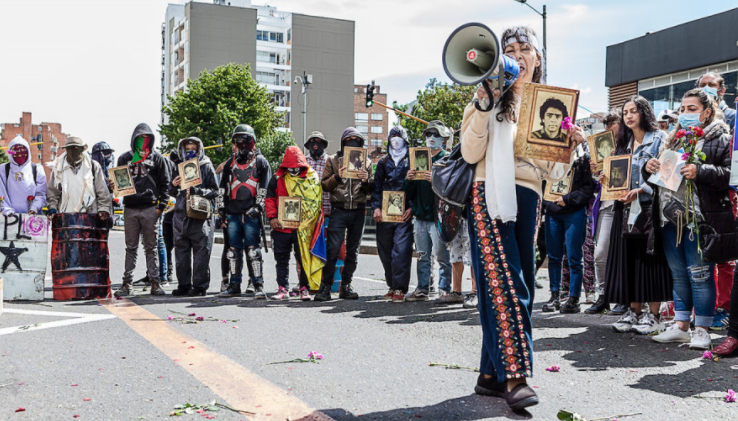
Photo: “Yanette Bautista cries out for justice in front of the JEP accompanied by frontline members.” Source: J. Marcos / Mª Ángeles Fernández.
On September 22, CTXT published this feature length article in Spanish: Las víctimas que Colombia no quiere.
Key excepts from the article include:
In Colombia, the number of missing persons has numbered in the thousands since the late 70s.
The National Center for Historical Memory speaks of 80,472 victims, of which almost 59,000 are still missing, 8,100 have been found dead and more than 11,000 the whereabouts are not known but there is information.
The Nydia Érika Bautista Foundation for Human Rights counts more than 120,000 people.
Nydia Érika Bautista disappeared on August 29, 34 years ago.
The morning [of August 29, 2021] is cold in Bogotá, even the rain appears momentarily in the symbolic act of planting plants. The new flowery corner is called ‘Garden of Memory’ and is located on the Park Way.
“Let’s take the opportunity to think about them and them. Let’s remember, let’s honor them,” asks one of the members of the Nydia Érika Bautista Foundation, the collective that convenes the day.
Nydia’s sister, Yanette Bautista, and her niece Andrea Torres, who saw their aunt being taken away, run an organization that was born in exile.
The family had to leave in the face of threats and today, again in Colombia, they fight for the search for people, for truth, for reparation, for non-repetition, for justice and peace.
“We have walked these 34 years demanding justice and we have not achieved it, but we are moving forward. Colombia has not yet reached the truth of what happened during the armed conflict, nor justice or non-repetition.”
Micro in hand, Yanette Bautista, a wiry, serious woman, with a beautiful and long brunette braid half discarded, speaks with a strength that her body disguises.
“Let them be returned to us alive!” she cries; “Because they took them alive!” reply the forty people participating in the symbolic act of sowing. “Missing!” she continues. “Present, present, present!” they follow. “Until when?” she insists. “See you always!” they close.
Yanette Bautista was also there because the foundation she presides over was one of the conveners.
Although her body was lost among those who protested, when she picked up a loudspeaker, she stood as a true leader: “We demand that the JEP [Special Jurisdiction for Peace] open a macro-case of forced disappearance. We don’t want to be discriminated against anymore, we don’t want justice to be inequitable. We are here to demand that the JEP listen to us. Enforced disappearances are crimes against humanity and we claim our right to know the truth and to full reparation.”
“We are here with the young people of the front line of the Resistance Portal who are accompanying us in our demands. And we are with them because they are leaders of social protest, they are leaders of the popular movement and they have the right to a good name and to have their demands heard,” Yanette Bautista shouted again with force, surrounded by a score of young people locked in front of number 63-44 of Carrera 7 in Bogotá.
Dressed entirely in black, barely a millimeter of skin in the air, a member of the front lines read a poem dedicated to Nydia Érika Bautista.
“They plucked you from the earth mercilessly, under the complicit shadow (…) leaving in the mud a future snatched (…) The hatred continued in the dispossession of a generation of dreamers. In you, Nydia, the memory of building a new world is reborn.”
We encourage you to read the full article at Las víctimas que Colombia no quiere.
The Peace Brigades International-Colombia Project has accompanied the “Nydia Erika Bautista” Foundation occasionally since 2007 and fully since 2016.


